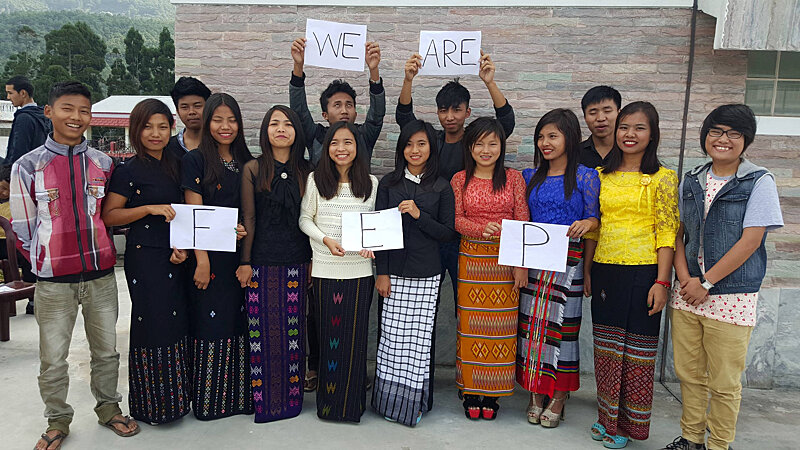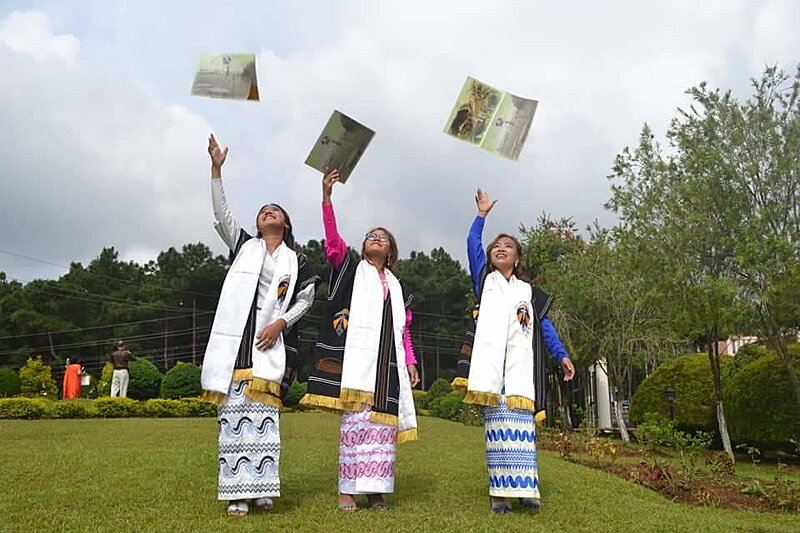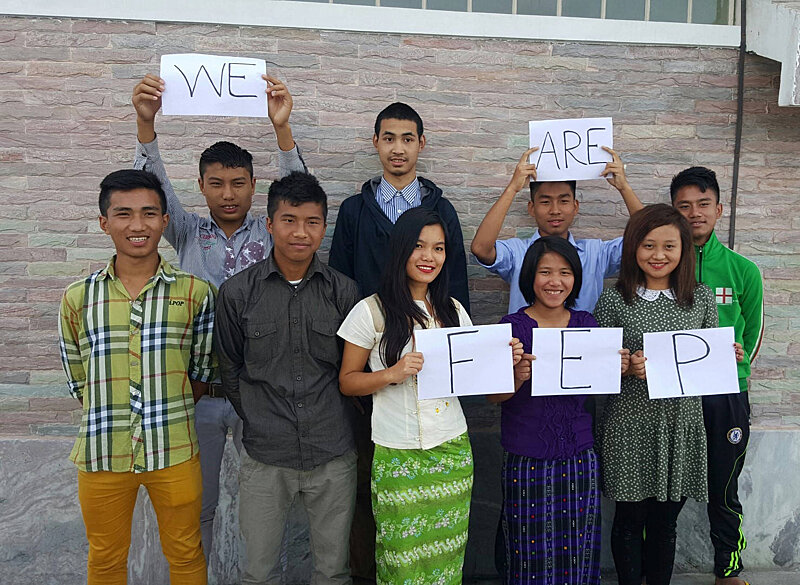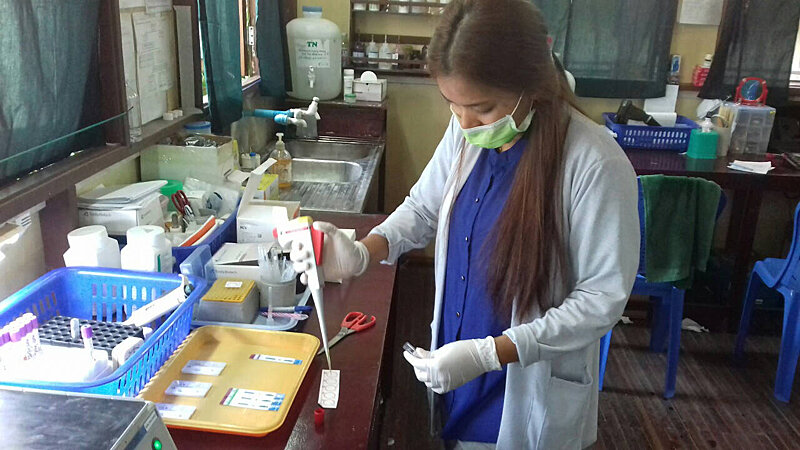Education
Our goal is that young people experience improved educational prospects, long-term socio-economic wellbeing and are proactively contributing towards the development of their local community.
Children in Chin State live in a neglected and impoverished region of Myanmar and face a myriad of challenges in their attempts to seek a basic education. The area is remote, the landscape rugged and the population scattered. A chronic lack of investment and recurrent natural disasters have led to the highest rate of household poverty in Myanmar (58% living on less than $1 / day, 2017 src: UNDP / World Bank), poor infrastructure, food insecurity and poorly functioning health and education systems.
The education system throughout Myanmar is in crisis and has collapsed, with the very real possibility of a generation of young people missing out entirely on their education.
The education system currently excludes rural, poor, ethnic minority children due to language barriers, location, poverty, and curriculum content. Pre-school coverage in Chin State is severely limited and the levels of supervision and quality of teaching vary widely. Children often receive no teaching in their ethnic language.
In rural areas, the high poverty levels, combined with lack of access to educational services, and exams often set in non-ethnic languages, contribute to only 8% of children passing their final exams at age 15, compared to 17.8% in urban areas. Last year, less than 5% of students passed their Year 10 exams in Chin State. This dismal pass rate has contributed to weaknesses in local drivers for change, as only students who matriculate from year 10 are able to secure formal employment or go on to further education.
Working together to rebuild hope for a brighter future
Chin State is one of the poorest regions in Myanmar. As a result of the country’s severe troubles, school enrolment is very low. In rural areas, high poverty levels, combined with a lack of access to educational services, the impact of covid-19 and exams often set in non-ethnic languages, contribute to just 8% of children passing their final exams at age 15.
We believe that education is crucial in building long-term sustainable development in Myanmar. Better education serves to raise levels of social awareness, and cultivates leaders who can be catalysts for bringing about a fairer society.
Since 2012, Health & Hope has been working with local communities to restore broken dreams, lift young people out of poverty and enable them to give back to their communities through our Freedom to Education Programme. We also sponsor, as part of the same programme, students taking undergraduate degrees in subjects ranging from medicine to engineering to business administration.
The Freedom to Education Project (FEP) provides scholarships and support to individuals who have passed their year 10 exams. This support enables young people to continue their education, and go on to university.
The challenges children face in rural areas of western Myanmar in their attempts to access education:
- The ongoing impact of the military coup of 2021
- Rugged geography
- A scattered population
- Natural disasters
- Food insecurity
- Teaching in non-ethnic languages
- A lack of qualified teachers
These challenges, combined with the highest levels of household poverty (73%) in Myanmar, have led to a school drop-out rate of 18% by Year 5 in Chin State, and only 8% of children passing Year 10 in rural areas, where poverty is greatest.
How the Freedom to Education Programme is making a difference to the lives of young people from Myanmar
Health & Hope offer students the opportunity to pursue higher education. We look for individuals who carry a vision for using their education as a means for helping their communities. They are provided with accommodation, subsistence, mentoring and support towards educational fees.
Thanks to the generosity of supporters, this project has supported over 130 students from rural Chin State to undertake college and university education. Successful graduates from this project have returned to Myanmar over the last few years, some taking up work as civil servants and in the private sector. However, a number of graduates have returned to Chin state to work with Health & Hope Myanmar. These have included doctors, nurses, and graduates from the fields of business and science.
We currently have 35 students being supported through their higher secondary studies, and a further 40 students studying at university. Intent on success, these students have overcome many challenges even to reach their colleges, including escaping war torn areas on foot. We believe these motivated and committed young people will have a powerful impact on their communities when they graduate.
The scholarship programme includes:
- Partial/full support of tuition fees
- Accommodation and living costs
- Three months of intensive English classes providing skills in speaking, reading, writing, and listening.
- Basic computer lessons
- Three months of language tuition to give students more confidence in reading, writing, and to engage well in some of the daily conversations.
- Personal development through coaching and mentoring and academic support
- Community engagement through social activities
Student testimonial:
“On behalf of our class, I want to express our heartfelt gratitude for your generous support towards our school fees. Thanks to your assistance, we have been able to purchase essential school materials such as books and pens. Thank you for your kindness and help.”
Myanmar Education Support
We are supporting four schools in Myanmar to ensure uninterrupted education, retain qualified teachers, alleviate financial burdens on families during this crisis and reduce student absenteeism.
A trial last year successfully achieved its objectives, demonstrating a positive impact on students, teachers, and the community.
Myanmar education continues to be severely disrupted following the 2021 military coup. School closures, violence against schools and teacher shortage due to the Civil Disobedience Movement and the ongoing nationwide conflicts have led to millions of children being out of school.
To cope with the crisis, local communities are also stepping up to support education, with volunteer teachers and community-run schools. The ongoing conflicts, coupled with soaring inflation and persistent road blockages, have crippled the local economy. Families struggle to afford school fees, placing schools at risk of closure due to unpaid teacher salaries.
Four community-run schools were selected due to a combination of factors: significant teacher shortages, a large student population drawn from ten neighbouring villages (including returnees displaced by the ongoing conflict), and the severe socioeconomic impact on the communities they serve.







